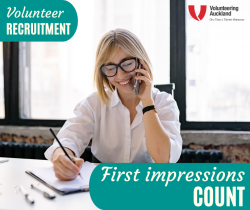Why Responding to Volunteer Enquiries Quickly Matters

Community organisations thrive because of volunteers, whose time and commitment often make the difference between what is possible and what is not. Yet one of the most overlooked aspects of volunteer management is the way organisations respond to enquiries from people interested in volunteering.
That first point of contact – whether it’s a phone call, an email, or a web form submission – sets the tone for the entire volunteer journey. Unfortunately, too many enquiries go unanswered or are met with long delays. The risk? Lost volunteers, damaged reputation, and missed opportunities to connect with people whose enthusiasm is at its peak.
The Risk to Reputation
In today’s connected world, word-of-mouth travels quickly. When someone reaches out to volunteer and doesn’t hear back, they are unlikely to sit quietly. They may share their disappointment with friends, family, or online communities. A single comment along the lines of “I tried to volunteer there but no one replied” can leave a lasting impression and deter others from engaging with your organisation.
Reputation is one of a community organisation’s most valuable assets. While programmes and services may be excellent, a poor reputation for responsiveness can undermine trust and credibility. Potential donors, partners, or future volunteers may hesitate to get involved if they perceive a lack of professionalism or care in how enquiries are handled.
Enthusiasm Has a Shelf Life
When someone decides to volunteer, they are often motivated by a surge of enthusiasm and goodwill. That motivation may be tied to a recent life change (such as retirement, a new job, or moving to a new city), or a personal desire to make a difference. This moment of decision is powerful – but it is also fleeting.
If a prospective volunteer doesn’t hear back promptly, the spark fades. They may assume the organisation doesn’t need them, that they’re not welcome, or that their time isn’t valued. And once lost, that enthusiasm rarely returns. In contrast, a timely and warm response can harness that energy and quickly channel it into meaningful engagement.
The First Impression Counts
First impressions matter in every sphere of life, and volunteer recruitment is no different. The way an organisation responds to an initial enquiry communicates volumes:
- Responsiveness shows respect for the person’s interest and time.
- Clarity shows that the organisation is organised and values transparency.
- Warmth shows that people, not just roles, are at the heart of the organisation.
A well-crafted response can make people feel excited, welcomed, and reassured that they are connecting with a place where their contribution will matter. Conversely, silence or a vague message can leave them questioning whether they should look elsewhere.
Building a Strong Communications System
So how can organisations ensure they respond effectively to volunteer enquiries, even when staff capacity is stretched? It comes down to having a clear, practical communication system. Here are some strategies:
1. Designate Responsibility
Make it someone’s specific responsibility to respond to volunteer enquiries. This could be a staff member, but it could also be a trusted volunteer who enjoys communication and has a welcoming manner. What matters is that the task is not left to chance or handled inconsistently.
2. Set a Response Standard
Decide on a reasonable timeframe for acknowledging enquiries – ideally within 48 hours. Even if the full information isn’t yet available, a quick acknowledgment (“Thank you for reaching out, we’ll be in touch soon”) reassures people that their message hasn’t been lost.
3. Use Templates – But Personalise Them
Having email templates for common enquiries saves time, but don’t rely solely on copy-and-paste. Personalising messages with the person’s name, referencing their specific interest, or highlighting an upcoming opportunity makes a big difference in creating a genuine connection.
4. Leverage Volunteer Support
Consider engaging existing volunteers to help manage this first-contact role. Many people enjoy connecting with others and sharing their positive experiences. Volunteers in this role can answer basic questions, share information packs, and schedule follow-ups with staff.
5. Use Technology Wisely
A volunteer management system, like Better Impact, CRM, or even a shared inbox with clear labelling can ensure enquiries are tracked and not overlooked. Some organisations also use automated responses that confirm receipt of an enquiry – but always follow up with a personal message soon after.
6. Prioritise First Contact
Treat the first contact as the start of a relationship. Encourage your team to see it not as an administrative task but as the first step in welcoming someone into your community. Training and support for whoever manages enquiries can ensure they project warmth, clarity, and enthusiasm.
Beyond the Reply – Building a Relationship
Responding quickly is just the first step. Effective volunteer engagement requires ongoing communication and relationship-building. Once a person has expressed interest:
- Provide them with clear next steps (application, orientation, trial shift, etc.).
- Keep them updated on timelines so they don’t feel left in limbo.
- Offer opportunities for two-way communication so they can ask questions or express preferences.
Remember: the process is as important as the placement. A seamless, welcoming journey from enquiry to active volunteering reflects the culture of your organisation and shows volunteers they are truly valued.
Conclusion
Every enquiry from a potential volunteer is a gift – an opportunity to bring new energy, skills, and passion into your organisation. Failing to respond promptly risks not only losing that individual but also damaging your organisation’s reputation in the community.
By prioritising the first point of contact, establishing clear communication systems, and engaging volunteers in the process, community organisations can ensure that no enquiry slips through the cracks. More importantly, they can turn initial interest into long-term commitment, strengthening both the organisation and the communities they serve.
In volunteering, as in life, the small things matter. A timely, warm, and thoughtful response can make the difference between someone walking away – or walking in and becoming one of your organisation’s greatest supporters.

